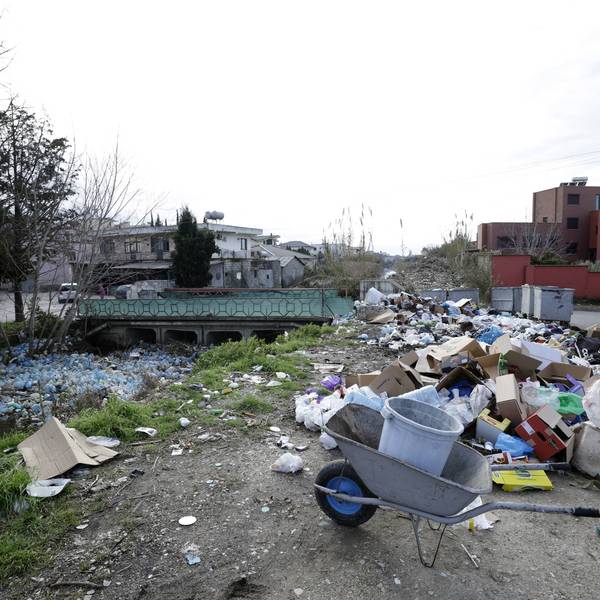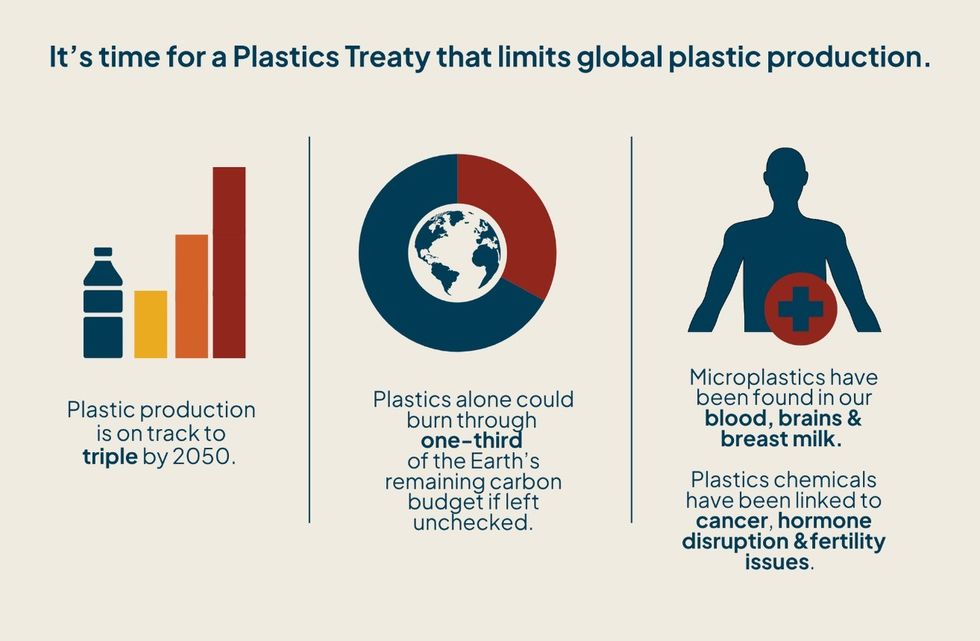Stakes—and nerves—are high heading into what is supposed to be the final scheduled round of Plastics Treaty negotiations. From August 5 to 14, United Nations member states will meet in Geneva, Switzerland. The question on everyone’s mind: Will they deliver the treaty the world urgently needs?
What’s at Stake
The global plastics crisis is accelerating, threatening public health, ecosystems, and economies worldwide. Plastic production is on track to triple by 2050, driving 20% of global oil demand within the next two decades. Nearly 99% of plastics are made from fossil fuels—the main driver of climate change. If left unchecked, plastics could burn through one-third of the Earth’s remaining carbon budget, derailing efforts to limit global warming.
Every week, new studies uncover toxic impacts on our bodies, water, and food systems—from microplastics found in human blood and breast milk, to links between plastic chemicals and cancer, hormone disruption, and fertility issues. This is a crisis of human health, not just “a waste management problem.”

We’re headed to Geneva with our hearts and minds set on a treaty that caps and controls plastic production, addresses the toxic chemicals used to make plastics, ensures supply chain transparency, and delivers the financial mechanisms needed to stop plastic pollution and its climate and health-ravaging impacts.
10 Things To Know about INC-5.2
This is the second “final” negotiation—and it might not be the last.
The goal of Intergovernmental Negotiating Committee (INC)-5 in Busan was to deliver the final text of a future plastics treaty. Instead, negotiations stalled as a small bloc of petrochemical-producing states delayed and watered down progress, even as a global majority pushed for bold action to cut plastic production and ban toxic chemicals. The current draft text now stands at 22 pages with more than 370 brackets, indicating areas where there is no agreement. At 10 days, INC-5.2 is the longest session yet, and several countries are determined to finish the job. “Our single priority now must be to resolve the remaining issues on which Members have not yet reached common ground,” says Ambassador Luis Vayas Valdivieso, the chair of the INC. Whether those deep divides can be bridged remains to be seen, but this is where most countries will focus their energy.The biggest decision may be how decisions get made.
The power of these negotiations—and the future treaty—both hinge on how countries can take action when consensus fails. The draft Rules of Procedure allow for qualified majority voting when consensus fails—but since INC-2 in Paris, a few countries have insisted—without legal basis—that decisions can only be made by consensus, using this approach to derail negotiations and block progress over the past two years. Will INC-5.2 be the moment when fed-up countries invoke the rules to break a deadlock and protect the treaty’s ambition? Equally critical is how decisions will be made once the treaty enters into force. Member states have yet to determine whether sessions of the future Conference of the Parties (COP) will use majority voting or require consensus. If the latter prevails, there’s a real risk the treaty will follow the path of the U.N. climate talks, where consensus has gridlocked for years. Will the final treaty empower future COPs to act when consensus can’t be reached? The fight over production caps is make-or-break.
At the close of Busan, more than 100 member states drew a red line: no treaty without plastic production limits. That commitment was echoed last month in the Nice Wake Up Call at the U.N. Oceans Conference. But with pressure mounting to conclude the talks—and the nearly $40 million tab—will countries hold firm or cave to industry-backed calls for “consensus”? The world can’t afford a treaty that fails to address the root of the problem. In addition to securing production limits, countries will need to agree on a carefully balanced set of provisions across what many are now calling “the package”—a core group of interdependent articles that will determine whether the treaty is truly effective or just symbolic.Economic calls for a production cap are growing.
It’s no longer just scientists and advocates calling for limits on plastic production—economists are sounding the alarm. The sector is in crisis: Overcapacity has driven down prices; profit margins are collapsing; and credit downgrades, reputational risks, and regulatory pressures are all rising. Plastic plants are already operating well below capacity. Continuing to expand production, economists warn, isn’t just dangerous—it’s reckless. A treaty without production limits ignores both science and economic reality.Fossil fuel lobbyists will flood the talks—again.
At INC-5.1, there were three times more fossil fuel and chemical industry lobbyists than scientists—and nine times more than Indigenous Peoples. With each round of negotiations, their presence and influence have grown: from intimidating scientists to securing seats on national delegations. Scores more lobbyists representing fast-moving consumer goods companies, packaging manufacturers, and other plastics-dependent industries have also been present in the negotiations. Without strong conflict of interest policies, the very polluters driving the plastics crisis are being allowed to shape the treaty meant to stop it. That cannot continue.Closed-door negotiations are raising alarms.
Despite a mandate for the “widest and most effective participation possible,” most sessions in Busan excluded observers and media, raising serious concerns about transparency and accountability. With thousands of observers expected in Geneva, it’s critical they have meaningful access, not just token spaces outside the talks. Scientists, Indigenous leaders, and civil society all play a crucial role in providing lived experience, expertise, and public oversight that the process urgently needs.Will the COPs be good COPs or bad COPs?
Once the treaty enters into force, parties will meet at COPs to assess implementation and adopt new measures. Under pressure to finalize the talks, some governments may be tempted to postpone major decisions—like whether the treaty should address production or toxic chemicals—to future COPs, kicking the can down the road. History shows that when key elements are left out of a treaty’s original text, it rarely gets added later, especially when decisions need to be made by consensus. The U.N. Framework Convention on Climate Change has spent 30 years trying to address the omission of fossil fuels—with limited success. Foundational measures must be locked into the treaty itself, not left to future debates.The fight to host the DipCon—and name the treaty—is on.
Several countries are vying to host the Diplomatic Conference of the Plenipotentiaries (DipCon), where the treaty will be signed. Why? Because treaties are often remembered by the name of the signing city—think the Paris agreement, the Kyoto Protocol, or the Stockholm Convention. Hosting the DipCon means a place in history.Ministers will fly in to seal the deal.
So far, negotiations have been led mostly by diplomats. But toward the end of INC-5.2, more than 70 ministers are expected to arrive, hoping to strike political deals and close out the text. Whether their presence will break the deadlock—or deepen divides—remains to be seen.Who pays and how is still unresolved.
Everyone agrees the treaty will require serious financing. But how much, from whom, and through what mechanism remains hotly debated. Will wealthy countries foot the bill? Will polluting industries be required to contribute? And should the treaty create a brand-new fund or rely on existing ones? Either way, financing must support a just transition—ensuring that environmental progress goes hand in hand with decent, safe, and sustainable jobs. Without a robust financial mechanism, the treaty risks being all talk, no action.





